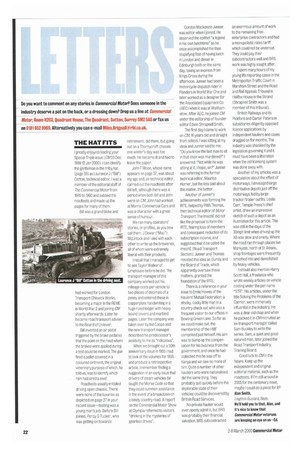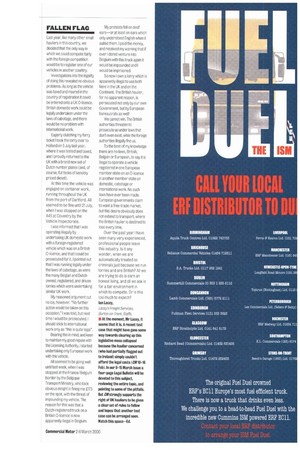THE HAT FITS
Page 24

Page 25

If you've noticed an error in this article please click here to report it so we can fix it.
I greatly enjoyed reading your Special Triple issue (CM23 Dec 1999-12 Jan 2000). I can identify the gentleman in the trilby hat (page 59) as Laurence J ("Bill") Cotton, technical editor. I was a member of the editorial staff of The Commercial Motor from 1945 to 1960 and subbed the roadtests and made up the pages for many of them.
Bill was a grand bloke and had worked for London Transport Chiswick Works. becoming a major in the REME in World War 2 and joining CM shortly afterwards. Later he became road transport adviser to the Board of Unilever.
Bill invented an air pistol triggered by the brake pedal so that the point on the road where the brakes were applied during a test could be marked. The gun fired a pellet covered in a coloured ointment, the original veterinary purpose of which, he told us, was to identify which ram had sired a ewe!
Roadtests usually entailed driving open chassis. There were none of the luxuries as depicted on page 27 in your recent issue—testing was a young man's job. Before Bill joined, Percy G Tucker, who was getting on towards retirement, did them, but going out on a Thornycroft chassis one winter's day was too much. He became ill and had to leave the paper.
John F Moon, whose name appears on page 37, was about my age and, as technical editor, carried out the roadtests after Bill left, although there was a period when both Bill and John were on CM. John had worked at Morris Commercial Cars and was a character with a great sense of humour.
We ran many operators' stories, or profiles, as you now call them. J Dewar ("Mac") McLintock and I vied with each other to write up the breweries, all of whom were extremely liberal with their products.
I recall that I managed to get to see Taylor Walker of Limehouse before he did. The transport manager of this company worked out his mileage costs per vehicle to two places of decimals of a penny and entered these in copperplate handwriting in a huge ruled ledger with heavy bound covers and marbled pages. Later the company was taken over by Ind Coope and the new transport manager described his predecessor's assiduity to roe as "ridiculous".
When we brought out a 50th anniversary issue in 19551 had to look at the volumes for 1905 and produce a retrospective article. I remember finding a suggestion in an early issue that drivers of steam vehicles be taught the Morse Code so that they could summon assistance in the event of a breakdown on a lonely country road. A report on the Commercial Motor Show at Olympia referred to visitors "drinking in the mysteries of gearless drives".
Gordon Mackenzie Junner was editor when I joined. He deserved the epithet "a legend in his own lunchtime" as he once accomplished the then stupefying feat of having lunch in London and dinner in Edinburgh both on the same day, taking an express from Kings Cross during the afternoon. Junner had been a motorcycle dispatch rider in Flanders in World War One and later worked as a designer for the Associated Equipment Co (AEC) when it was at Walthamstow. After AEC, he joined CM under the editorship of founder editor Edwin Shrapnell Smith.
The first day I came to work on CM, 16 years old and straight from school, I was sitting at my desk and Junner said to me: "Do you know the last man to sit in that chair was murdered?" I answered: "Not while he was sitting at it, I hope, sir?" Junner was referring to the former technical editor, Maurice Homer, but the less said about this matter, the better.
Another ofJunner's achievements was forming the IRTE, helped by PMA Thomas, then technical editor of Motor Transport. The ImechE did not like the proposal to form the IRTE, fearing loss of members and consequent reduction of its subscription income, and suggested that it be called the ImechE (Road Transport Section). Junner and Thomas resisted this idea as clumsy and the Board of Trade, which apparently oversaw these matters, granted the foundation of the !RTE.
There is a reference in your issue to Ernie Howes of the Haulers' Mutual Federation: a stocky, cocky little man in a country check suit who was a frequent visitor to our offices in Bowling Green Lane. So far as we could make out, the membership of the HMF comprised just himself. His aim was to bump up the compensation for his business from the government, and once he had collected this he was off to Kenya and we saw no more of him, Quite a number of other hauliers who were nationalised did the same thing. They probably quit quickly before the deplorable state of their vehicles could be discovered by British Road Services.
No private haulier would ever openly admit it, but BRS was probably their financial salvation. BRS subcontracted an enormous amount of work to the remaining freeenterprise contractors and had a monopolistic rates tariff which could not be undercut. They could pay their subcontractors well and BRS work was highly sought after.
I spent many hours of my young life reporting cases in the Metropolitan Traffic Court in Marsham Street and the Road and Rail Appeals Tribunal in Halifax House in the Strand (ShrapnellSmith was a member of this tribunal).
British Railways and its Pickford and Carter Paterson subsidiaries diligently opposed licence applications by independent hauliers and cases dragged on for months. The industry was shackled by the legislation governing it and it must have been a liberation when the old licensing system was done away with.
Another of my articles was a speculation about the effect of motorways. I envisaged large distributive depots just off the motorways fed by large tractor/trailer outfits. Leslie Carr, Temple Press's chief artist, drew an impressive sketch of such a depot as an illustration for this article. This was still in the days of the 30mph limit when driving up the AS was slow and smelly. Where the road ran through places like Markyate, north of St Albans, shop frontages were frequently smashed into and demolished by heavy vehicles.
I should also mention Harry Scott Hall, a freelance who wrote weekly articles on vehicle costing under the pen name "SIR". His articles, under the title Solving the Problems of the Carrier, were immensely influential in the industry. He was a dear old chap and when he packed it in CM recruited an ex-transport manager called Sam Buckley to write the series. Sam, a quiet and goodnatured man, later joined the Road Transport Industry Training Board.
Good luck to CMin the future. Keep up the independent and original editorial material, such as the roadtests. If I'm still around in 2005 for the centenary issue, maybe I could do a piece for it? Alan Smith, 1 eiahton Buzzard, Beds.
We'll hold you to that. Alan. and It's nice to know that Commercial Motor veterans are keeping an eye on us—Ed.
FALLEN FLAG
Last year, like many other small hauliers in this country, we decided that the only way in which we could compete fairly with the foreign competition would be to register one of our vehicles in another country.
Investigations into the legality of doing this revealed no obvious problems. As long as the vehicle was taxed and insured in the country of registration it could be entered onto a UK 0-licence. British domestic work could be legally undertaken under the laws of cabotage, and there would be no problem with international work.
Eagerly clutching my ferry ticket I took the lorry over to Holland on 5 July last year, where it was tested and taxed, and I proudly returned to the UK with a brand new set of Dutch number plates (and, of course, full tanks of sensibly priced diesel).
At this time the vehicle was engaged on container work, running throughout the UK from the port of Dartford. All seemed to be fine until 21July, when I was stopped on the 445 at Coventry by the Vehicle Inspectorate.
I was informed that I was Operating illegally by undertaking UK domestic work with a foreign-registered vehicle which was on a British 0-licence, and that I could be prosecuted for it. I pointed out that I was running legally under the laws of cabotage, as were the many Belgian and Dutchowned, registered, and driven lorries which were undertaking similar UK work.
My reasoned argument cut no ice, however. "No further action would be taken on this occasion," I was told, but next time I would be prosecuted, I should stick to international work only as "this is quite legal'.
Bearing this in mind, and keen to maintain my good repute wit" the Licensing Authority, I started undertaking only European work with this vehicle.
All seemed to be going well until last week, when I was stopped at the France/Belgium border by the Belgique Transport Ministry, who took obvious delight in fining me £175 on the spot, with the threat of impounding my vehicle. The reason for this was that a Dutch-registered truck on a British 0-licence is now apparently illegal in Belgium. My protests fell on deaf ears—or at least on ears which only understood English when it suited them. I paid the money, and received my warning that if ever I dared venture into Belgium with this truck again it would be impounded and I would be imprisoned.
So now I own a lorry which is apparently illegal to use both here in the UK and on the Continent. The British haulier, for no apparent reason, is persecuted not only by our own Government, but by European bureaucrats as well!
We cannot win. The British authorities threaten to prosecute us under laws that don't even exist, while the foreign authorities illegally fine us.
To the best of my knowledge there arena laws, British, Belgian or European, to say it is illegal to operate a vehicle registered in one European member state on an 0-licence in another member state on domestic, cabotage or international work. No such laws have ever been made. European governments claim to want a free-trade market, but this desire obviously does not extend to transport, where the British haulier is destined to lose every time.
Over the past year I have seen many very experienced, professional people leave this industry. Is it any wonder, when we are automatically treated as criminals just because we run lorries and are British? All we are trying to do is earn an honest living, and all we ask is for a fair environment in which to compete. Or is this too much to expect?
Ian Lacey, Lacey's Freight Services, Burton-enTrent, Staffs.
• At the moment, Mr Lacey, it seems that it isA recent test case that might have gone some way towards clearing up this legislative mess collapsed because the haulier concerned (who had partially flagged out to Ireland) simply couldn't afford the legal costs (CM10-16 Feb). In our 9-15 March issue a four-page Legal Bulletin will be devoted to this subject. reviewing the entire topic, and pointing to some of the pitfalls. But CM strongly supports the right of Ilk hauliers to be given a clear set of rules to follow and hopes that another test case can be arranged soon. Watch this space—Ed.








































































































